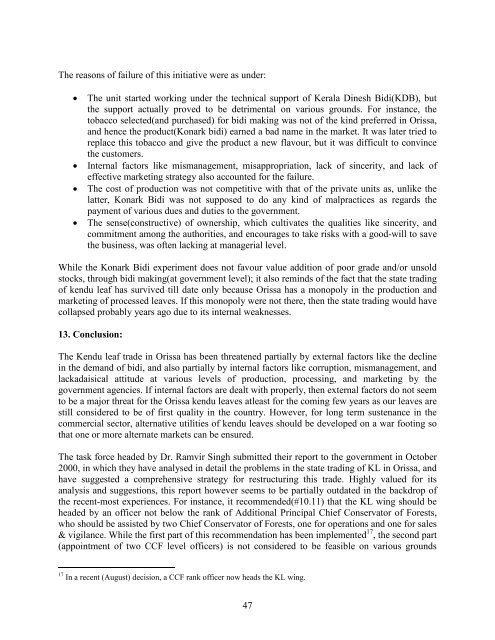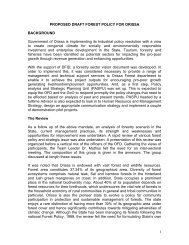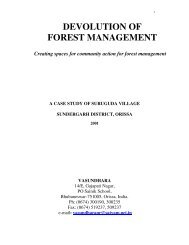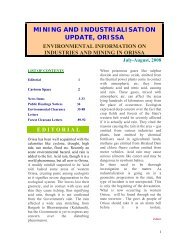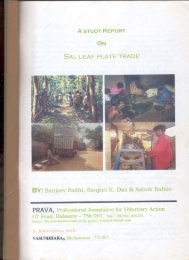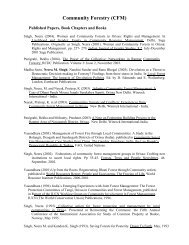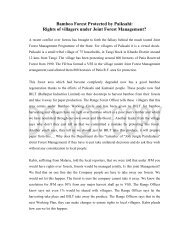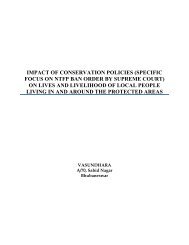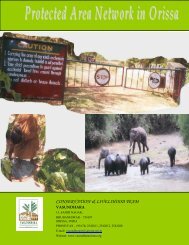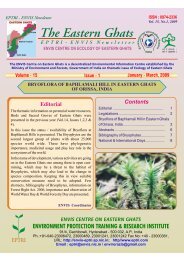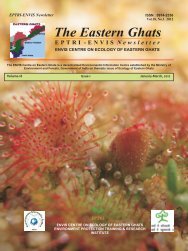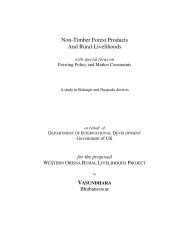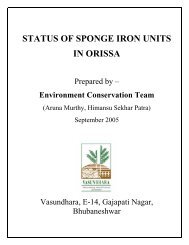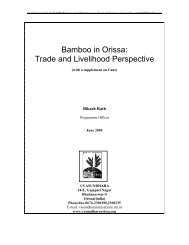The Kendu Leaf Trade: Problems & Prospects in Orissa - Vasundhara
The Kendu Leaf Trade: Problems & Prospects in Orissa - Vasundhara
The Kendu Leaf Trade: Problems & Prospects in Orissa - Vasundhara
You also want an ePaper? Increase the reach of your titles
YUMPU automatically turns print PDFs into web optimized ePapers that Google loves.
<strong>The</strong> reasons of failure of this <strong>in</strong>itiative were as under:<br />
• <strong>The</strong> unit started work<strong>in</strong>g under the technical support of Kerala D<strong>in</strong>esh Bidi(KDB), but<br />
the support actually proved to be detrimental on various grounds. For <strong>in</strong>stance, the<br />
tobacco selected(and purchased) for bidi mak<strong>in</strong>g was not of the k<strong>in</strong>d preferred <strong>in</strong> <strong>Orissa</strong>,<br />
and hence the product(Konark bidi) earned a bad name <strong>in</strong> the market. It was later tried to<br />
replace this tobacco and give the product a new flavour, but it was difficult to conv<strong>in</strong>ce<br />
the customers.<br />
• Internal factors like mismanagement, misappropriation, lack of s<strong>in</strong>cerity, and lack of<br />
effective market<strong>in</strong>g strategy also accounted for the failure.<br />
• <strong>The</strong> cost of production was not competitive with that of the private units as, unlike the<br />
latter, Konark Bidi was not supposed to do any k<strong>in</strong>d of malpractices as regards the<br />
payment of various dues and duties to the government.<br />
• <strong>The</strong> sense(constructive) of ownership, which cultivates the qualities like s<strong>in</strong>cerity, and<br />
commitment among the authorities, and encourages to take risks with a good-will to save<br />
the bus<strong>in</strong>ess, was often lack<strong>in</strong>g at managerial level.<br />
While the Konark Bidi experiment does not favour value addition of poor grade and/or unsold<br />
stocks, through bidi mak<strong>in</strong>g(at government level); it also rem<strong>in</strong>ds of the fact that the state trad<strong>in</strong>g<br />
of kendu leaf has survived till date only because <strong>Orissa</strong> has a monopoly <strong>in</strong> the production and<br />
market<strong>in</strong>g of processed leaves. If this monopoly were not there, then the state trad<strong>in</strong>g would have<br />
collapsed probably years ago due to its <strong>in</strong>ternal weaknesses.<br />
13. Conclusion:<br />
<strong>The</strong> <strong>Kendu</strong> leaf trade <strong>in</strong> <strong>Orissa</strong> has been threatened partially by external factors like the decl<strong>in</strong>e<br />
<strong>in</strong> the demand of bidi, and also partially by <strong>in</strong>ternal factors like corruption, mismanagement, and<br />
lackadaisical attitude at various levels of production, process<strong>in</strong>g, and market<strong>in</strong>g by the<br />
government agencies. If <strong>in</strong>ternal factors are dealt with properly, then external factors do not seem<br />
to be a major threat for the <strong>Orissa</strong> kendu leaves atleast for the com<strong>in</strong>g few years as our leaves are<br />
still considered to be of first quality <strong>in</strong> the country. However, for long term sustenance <strong>in</strong> the<br />
commercial sector, alternative utilities of kendu leaves should be developed on a war foot<strong>in</strong>g so<br />
that one or more alternate markets can be ensured.<br />
<strong>The</strong> task force headed by Dr. Ramvir S<strong>in</strong>gh submitted their report to the government <strong>in</strong> October<br />
2000, <strong>in</strong> which they have analysed <strong>in</strong> detail the problems <strong>in</strong> the state trad<strong>in</strong>g of KL <strong>in</strong> <strong>Orissa</strong>, and<br />
have suggested a comprehensive strategy for restructur<strong>in</strong>g this trade. Highly valued for its<br />
analysis and suggestions, this report however seems to be partially outdated <strong>in</strong> the backdrop of<br />
the recent-most experiences. For <strong>in</strong>stance, it recommended(#10.11) that the KL w<strong>in</strong>g should be<br />
headed by an officer not below the rank of Additional Pr<strong>in</strong>cipal Chief Conservator of Forests,<br />
who should be assisted by two Chief Conservator of Forests, one for operations and one for sales<br />
& vigilance. While the first part of this recommendation has been implemented 17 , the second part<br />
(appo<strong>in</strong>tment of two CCF level officers) is not considered to be feasible on various grounds<br />
17 In a recent (August) decision, a CCF rank officer now heads the KL w<strong>in</strong>g.<br />
47


